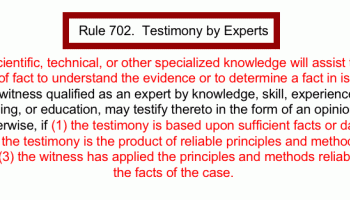Aviso de archivo
Esta es una página de archivo que ya no se actualiza. Puede contener información desactualizada y es posible que los enlaces ya no funcionen como se pretendía originalmente.
Home | Glossary | Resources | Help | Contact Us | Course Map
Federal Rule of Evidence Rule 702 requires the state to show that the proffered testimony will assist the trier of fact in understanding the evidence of the case or determining a fact in issue.
In some jurisdictions, the qualifying or voir dire portion of the DNA analyst's testimony is conducted outside the jury's presence, while in others it may be conducted with the jury present. If the DNA analyst is qualified outside the jury's presence, the prosecutor should not agree to stipulate as to the analyst's qualifications, but rather repeat these for the jury so they may fully hear the extensive background, training, and experience of the analyst for themselves. The prosecutor can use the same voir dire questions in front of the jury used earlier to qualify the analyst as an expert to the court.
|
Federal Rule of Evidence Rule 702 |
|
| “If the scientific, technical, or other specialized knowledge will assist the trier of fact to understand the evidence or to determine a fact in issue, a witness qualified as an expert by knowledge, skill, experience, training, or education may testify thereto in the form of an opinion or otherwise, if the | |
| 1. | Testimony is based upon sufficient facts or data, |
| 2. | Testimony is the product of reliable principles and methods, and |
| 3. | Witness has applied the principles and methods reliably to the facts of the case. |
Additional Online Courses
- What Every First Responding Officer Should Know About DNA Evidence
- Collecting DNA Evidence at Property Crime Scenes
- DNA – A Prosecutor’s Practice Notebook
- Crime Scene and DNA Basics
- Laboratory Safety Programs
- DNA Amplification
- Population Genetics and Statistics
- Non-STR DNA Markers: SNPs, Y-STRs, LCN and mtDNA
- Firearms Examiner Training
- Forensic DNA Education for Law Enforcement Decisionmakers
- What Every Investigator and Evidence Technician Should Know About DNA Evidence
- Principles of Forensic DNA for Officers of the Court
- Law 101: Legal Guide for the Forensic Expert
- Laboratory Orientation and Testing of Body Fluids and Tissues
- DNA Extraction and Quantitation
- STR Data Analysis and Interpretation
- Communication Skills, Report Writing, and Courtroom Testimony
- Español for Law Enforcement
- Amplified DNA Product Separation for Forensic Analysts


